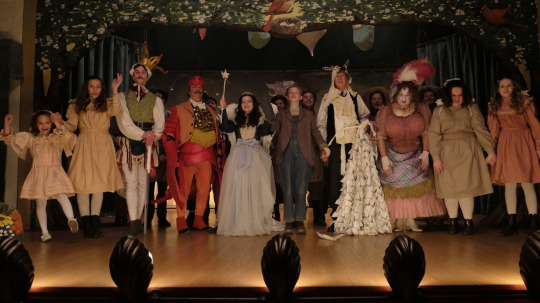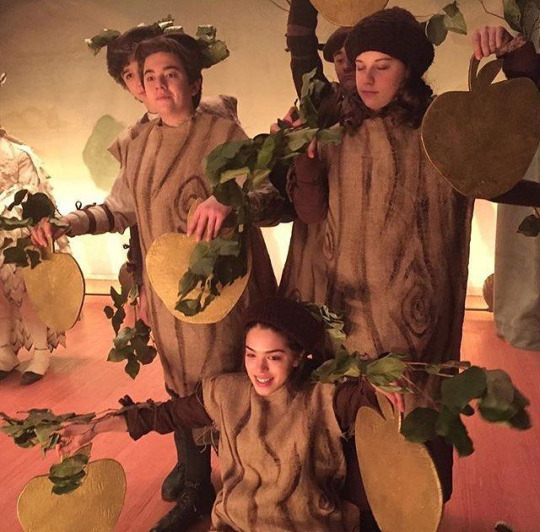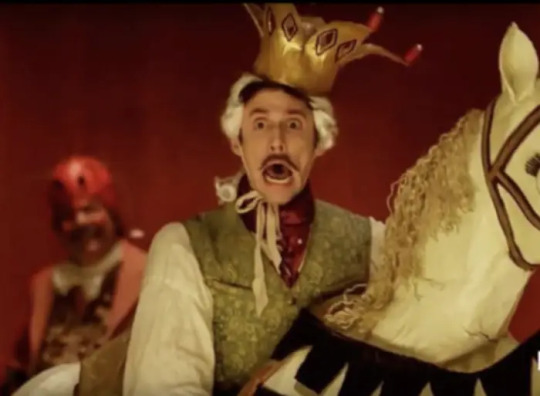#it makes up for the liberalism of “a gender balance” in S3
Explore tagged Tumblr posts
Text
AwaE's "Tale of the Magical Island" play

In the the sixth episode of Season 2 of Anne with an E entitled "I Protest Against Any Absolute Conclusion," the community of Avonlea comes together to put on the annual Christmas Pantomime. In this meta, I offer my analysis of this story within a story.
Not only does the plot of the panto draw heavily upon the story of Adam and Eve, but in my interpretation, it also allegorically serves as a way for Avonlea to use the medium of the theatre to process and come to grips with the threat that the grifters posed to their "magical island" community.
First, a brief synopsis of the play:
The opening number introduces the audience to an agrarian community residing on a "Magic Fantastical Island." Our hero, a farm boy, encounters a Fairy Princess who, seeing The Boy's hard work and goodness, bestows upon him a Golden Apple Tree which he vows to faithfully protect. A Dame happens upon the Golden Apple Tree and asks The Boy to hand her one of its fruits, but he refuses. When the Dame steals an apple, the Devil Lobster appears accompanied by a catchy tune. Things seem bleak when the Devil Lobster gets ahold of one of the apples, but a Prince on a noble steed arrives to vanquish the evil foe. However, the Devil Lobster thwarts the Prince by crushing his sword in his claws. As stormy skies swirl overhead, The Boy digs a large Black Hole with his trusty shovel and tricks the Devil Lobster into falling in. The hole swallows up the Devil Lobster, the day is saved, and they all lived happily ever after!
The Panto as Allegory for the Grifter Arc:
Ultimately, this play tells a simple story in which good triumphs over evil with a moral about resisting temptation and the perils of greed.
I would like to call attention to the fact that the apples are painted gold. Like their edenic counterpart, they symbolize sin and temptation, but in the context of this allegory, they also represent the enticing prospect of finding gold in Avonlea.

One of the Prince's lines suggests that if the Devil Lobster got his hands on the golden apples, it would bring spoil and rot upon the town's land ("You think you can turn our land into rot?/ I'm the unconquerable prince, lest you forgot!"). This parallels the threat that the mining operation posed to Avonlea—digging up the earth in the hopes of finding gold would have defiled the land and brought environmental destruction to the small farming town.
The Devil Lobster is defeated by falling into the Black Hole—this bears a striking resemblance to how Mr. Dunlop was ultimately caught by the townsfolk in S2E3 after he fell down the mining shaft at Nate's dig site.
It's significant that The Boy is the one who digs the hole to stop the Devil Lobster. The Boy represents the every child, and more specifically, the youth of Avonlea. While the adults of the town were easily swindled by Nate and Mr. Dunlop's gold scheme, it was children, specifically Anne, Diana, and to some extent Jerry, who were able to see through the grifters' ruse, put all the pieces together, and try to stop them from getting away with their scheme.
The version of events rendered in the play puts a more heroic spin on the role The Boy plays in thwarting the evildoer. He actively sets a trap for the Devil Lobster using the pivotal prop—a shovel—to do so. Since a shovel is a tool of excavation, this reflects how the excavation site Nate initially used to stage his con became a trap and holding place for Dunlop when their ruse came crashing down.
In reality, our child heroes were not so active nor successful in thwarting Nate and Dunlop. Only Dunlop was captured whereas Nate got away with the money. After their sleuthing in Charlottetown, Anne and Diana tried to warn the Barrys about what they'd discovered, but Diana's mother wouldn't hear any of it. Anne told Marilla who thankfully believed her, but by then it was too late, and the two literally got tied up. Meanwhile, Jerry had his own moment of realization, finally recognizing the boarders as the thieves who mugged him and stole his money in the finale of season 1. He tried to throw a punch at Nate, but got beat up again and fell unconscious. Mr. Dunlop only fell into the hole, not by any of the children's doing, but because he and Nate turned against each other.
The play credits the children as the real heroes in the story and offers a happier ending than the real version of events in which the community is still reeling from the financial blow of the con, lingering distrust—especially of outsiders—and feelings of regret and shame. In particular, we see how Marilla blames herself for inviting the boarders into their community and how the fallout of the the con hits the Barrys especially hard, manifesting as marital conflict between Diana's parents. The play's happier version of events helps the town process the ordeal they've gone through and imparts a moral they learned from the experience.
Each Character's Role in the Panto:
Anne as The Boy: Like the show itself, Anne is the protagonist of the play, our plucky hero. Her stepping into the role of The Boy was foreshadowed with her trip to Carmody earlier in the episode during which she dressed up like a boy. It's also fitting that Anne plays this part since she was the one who put all the clues together about the boarders' true intentions. The fact that Anne replaces Josie in the lead role of the play, as well as Matthew's last-minute substitution for Billy as the Owl, signifies that Anne and the Cuthberts are forces of progressive change in Avonlea.
Diana as the Fairy Princess: Most characters, including Anne, see Diana as the angelic image of a proper lady. She's generous, sweet, beautiful, and comes from a wealthy family. Like her Fairy Princess counterpart who awards The Boy for his hard work, Diana sees Anne's virtues even when others don't, and overall is a supportive and generous friend.
Matthew as the Owl: Matthew stepping into this role is foreshadowed in his flashback with his brother Michael in which a young Matthew can be seen whittling an owl figurine. Owls are associated with wisdom and true sight. This is a fitting choice for a narrator character in a play and also suits Matthew who demonstrates real wisdom.
Mr. Lynde as the Devil Lobster: In S2E2, a townsperson remarks that Mr. Lynde shows no moderation whatsoever as he piles his plate full of sweets. The Devil Lobster is the embodiment of greed and avarice and proclaims that he is "simply shimmering with sin." Tamatoa who? I only know the Devil Lobster! Also, it's clear that Rachel is super into seeing her husband acting a bit naughty and decided to have some fun with this casting choice.
The minister as the Fair Dame: Seeing the minister in drag is played for comedic effect. The Dame plays the part of Eve taking the apple from the Garden of Eden. While the minister was skeptical about the gold testing business, he did not dissuade the town's eagerness for material riches and therefore also shares responsibility for inviting avarice into Avonlea.
Mr. Phillips as the "Unconquerable" Prince: This is also played for laughs as it demonstrates Mr. Phillip's inflated sense of ego. He envisions himself as a gallant hero when in reality, he is anything but. The Prince is ineffectual at fighting off the Devil Lobster and runs away like a coward, much like how the adults and authority figures of Avonlea were completely bamboozled by the grifters.
Rachel Lynde as Queen Victoria: Perhaps a narcissistic casting choice on the part of Rachel, but let's be real, she was the artistic director behind this whole production and knocked it out of the park. Pop off, queen!
I hope you enjoyed this discussion of the "play within a play" in S2E6 of Anne with and E. This is probably my favorite episode in the whole series due to its many wholesome moments, especially Jerry giving Anne his Christmas card, Gilbert and Bash coming over to the Cuthbert's for Christmas dinner, and Matthew overcoming his stage fright. 10/10 would recommend. Of course the Christmas episode absolutely slaps!

#anne with an e#awae#awae s2e6#anne with an e s2e6#Christmas pantomime#meta#story within a story#i protest against any absolute conclusion#christmas panto#anne shirly cuthbert#matthew cuthbert#diana barry#mr. phillips#thomas lynde#rachel lynde#awae meta#anne with an e meta#i love media analysis#episode of all time#my favorite episode#i love this show#the devil lobster song slaps way harder than it has any right to#lowkey appreciation for the grifter arc#i know it's unpopular#but it serves a purpose#and presents a conflict that affects the whole community#and the natural word itself#extractivism is presented as an existential threat#ecofeminist slay for awae wbk#it makes up for the liberalism of “a gender balance” in S3
15 notes
·
View notes